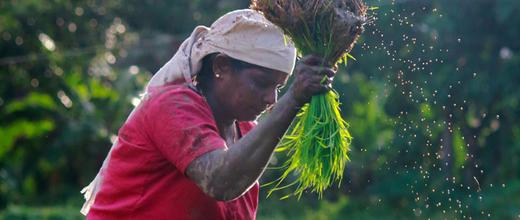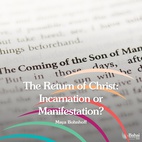The views expressed in our content reflect individual perspectives and do not represent the authoritative views of the Baha'i Faith.
After all of our work with farmers in South Africa over decades, we realized that the answer rests in a radical saying of the 1960s: subvert the dominant paradigm.
This means a fundamental change in thinking – rather than first considering the farm land itself, we need to begin with the farmer.
But what does it mean to “begin with the farmer”? The other dominant paradigm in maximizing agricultural production was training. But without going into countless stories of training that led nowhere, I concluded that commencing with the farmer required engaging farmers on a much more profound level than offering mere training.
It actually required learning rather than training – and not only learning by the farmer, but learning by the trainers, as well, in a spirit of humility, fellowship and love:
… we should look upon others with respect … The teacher should not consider himself as learned and others ignorant. Such a thought breedeth pride, and pride is not conducive to influence. The teacher should not see in himself any superiority; he should speak with the utmost kindliness, lowliness and humility, for such speech exerteth influence and educateth the souls. – Abdu’l-Baha, Selections from the Writings of Abdu’l-Baha, p. 30.
The difference between training and learning may sound like semantics, but it is not. When we learn to drive a car, first we are educated about the basics and the rules. Then we get practical training. Then we take a test and get a license. But any parent will tell you that education and training in driving, even having a license, does not equal truly learning and knowing how to drive.
Learning occurs when the student actively engages in internalizing theory, practice and experience – along with a knowledge and acceptance of the consequences and outcomes. That kind of deep learning occurs over a long period of time, both before and after getting a license. Training is not the same as education; education is not the same as learning.
I myself learned that if we focus on building the capacity of farmers, through promoting learning, then all other goals will be achieved eventually, and, more importantly, sustainably. We begin with the farmer and then extend this model of learning to the other classes in society. From a Baha’i perspective, by laying this “foundation for system and order” we can begin to create a just economy in which “all the members of the body politic shall be given the greatest achievements of the world of humanity” – Abdu’l-Baha, The Promulgation of Universal Peace, p. 312.
All of this means we have to stop measuring progress solely by numerical indicators. Irrespective of whether the numbers are good or bad, numbers provide us with a false sense of security or certainty. It just seems easier to measure progress, or the lack thereof, using numbers. But, as with the development of agriculture, any effective community-building program really concerns itself with the people in the program – with the farmer, not the farm.
We can take some pointers from Baha’i community-building programs, which include three key areas of learning:
- First, learning to increase the capacity of individuals to pray and study the Baha’i writings, to apply them in their daily lives, and to bring themselves to account by meditatively reflecting daily in that praxis. This learning most preciously gets expressed in acts of service to others.
- Second, learning to increase the capacity of the community to engage in collective action, motivated by a shared vision – again expressed in acts of collaborative service characterized by accompaniment and celebration of the accomplishments of others.
- Third, learning to increase the capacity of social institutions to coordinate individual and collective action and, most importantly, to create an environment conducive to a joyful commitment to learning and service.
Along the way, individuals can better learn how to engage in meaningful conversations instead of mundane gossip, and how to contribute rather than only take from society. Communities can learn better how to integrate spiritual principles and virtues with their collective material pursuits. Institutions can learn better how to stop relying exclusively on numerical goals, read the reality of their communities, govern with justice, love and integrity, and adhere to principles while creating flexibility.
The key to all this: begin with the farmer and not the farm.
Author’s note: I’d like to thank my son Cunningham Worth for his thoughtful contributions to this essay.

















Comments
Sign in or create an account
Continue with Facebookor